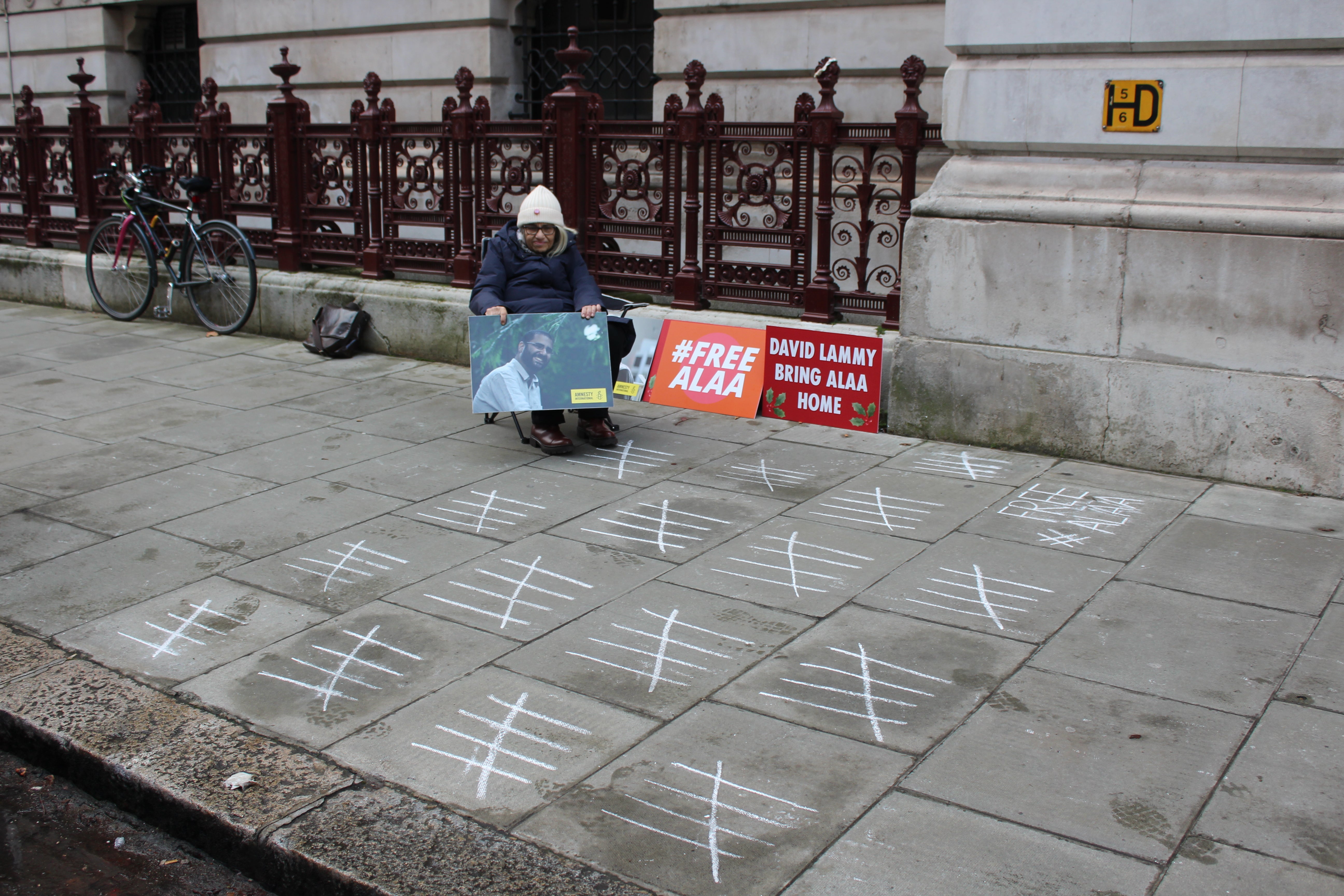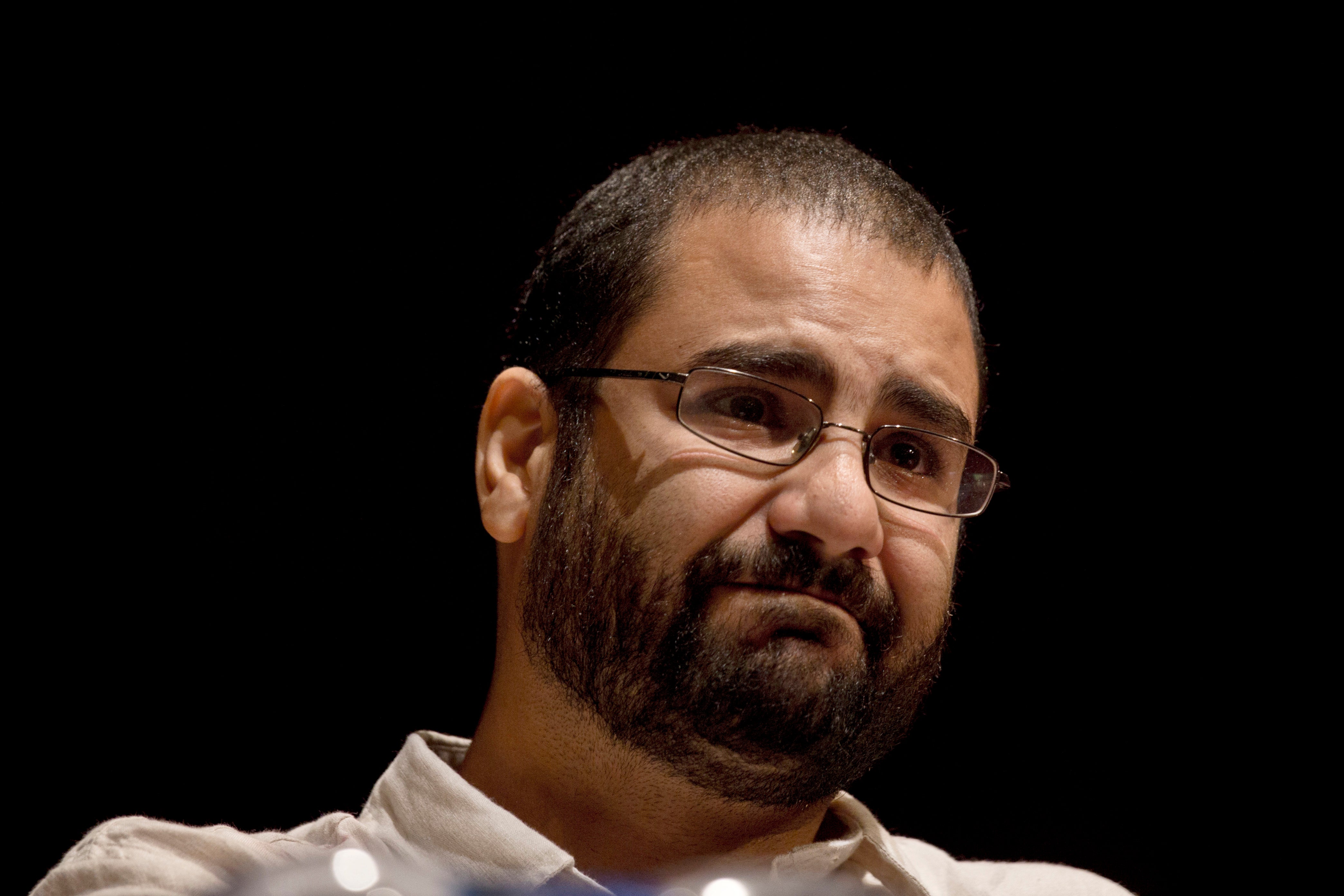‘I’ll starve myself until I collapse to secure my son’s release from Egyptian prison’, vows grandmother
Exclusive: Pro-democracy activist Alaa Abdel Fattah has been in prison in Egypt for more than 10 years on charges the United Nations says are unjust

Your support helps us to tell the story
From reproductive rights to climate change to Big Tech, The Independent is on the ground when the story is developing. Whether it's investigating the financials of Elon Musk's pro-Trump PAC or producing our latest documentary, 'The A Word', which shines a light on the American women fighting for reproductive rights, we know how important it is to parse out the facts from the messaging.
At such a critical moment in US history, we need reporters on the ground. Your donation allows us to keep sending journalists to speak to both sides of the story.
The Independent is trusted by Americans across the entire political spectrum. And unlike many other quality news outlets, we choose not to lock Americans out of our reporting and analysis with paywalls. We believe quality journalism should be available to everyone, paid for by those who can afford it.
Your support makes all the difference.In the Christmas cold outside the Foreign Office, 68-year-old grandmother Laila Soueif is starving herself.
White lines are being chalked onto the pavement in front of her, one for each day she has been on hunger strike. After the 80th line, the words “Free Alaa” follow.
The strike is intended to put pressure on the British government to secure the release of her son, pro-democracy activist Alaa Abdel Fattah, who is in jail in the Egyptian capital of Cairo. He holds British citizenship – his 13-year-old son, Khaled, lives in Brighton – but consecutive British governments have failed to demand his release seriously.

Living only off sugarless green tea and rehydration salts, this is Ms Soueif’s most extreme call for help. She has already lost nearly 25kg.
“Either my son comes out of prison or I collapse,” Ms Soueif says, wearing a coat now several sizes too big for her. “Once I am unconscious, it is not my business what happens.”
Mr Fattah has spent more than 10 years in prison over two stints, denied by the Egyptian authorities access to the British consulate, despite this being his right as a citizen. The second five-year sentence, for posting on Facebook about the death of an activist in police custody, expired on 29 September. But the date came and went.
Neither the Egyptian nor the British government acknowledged this end. Cairo had previously said the two years Mr Fattah has spent in pre-trial detention does not count towards his five-year sentence.
Nevertheless, the United Nations has described his sentences as unjust. David Lammy, the British foreign secretary, dismissed the imprisonment while in opposition as illegitimate and called for the Conservative government to do more to secure Mr Fattah’s release.

But his family say Mr Lammy has been less helpful since assuming office. A few months after Labour’s election victory, Mr Fattah’s sister, Sanaa Seif, accused the new foreign secretary of “ignoring” them. In a meeting hastily organised a few hours later by Mr Lammy’s team, the foreign secretary spoke of needing first to build a relationship with the Egyptians.
What Mr Lammy did not tell them, at the time, was that he had spent most of his meeting with his Egyptian counterpart a few days earlier talking about future trade conferences. The family said they only found this out because the Egyptian government posted about the meeting on Facebook.
Now, the family say they no longer recognise in the minister the man who once championed Mr Fattah’s freedom.
Sir Keir Starmer, meanwhile, failed even to mention Mr Fattah’s name when he met with Egyptian president Abdel Fattah El-Sisi in November.
The unfairness of Mr Fattah’s prolonged detention has caused a swelling of support for his release from the backbenches, with more than 100 MPs and peers recently writing to Mr Lammy to express their alarm about Mr Fattah’s imprisonment.

Celebrity endorsements have also poured in, including support from Naomi Klein, Christopher Eccleston, Joseph Fiennes and Bill Nighy. After Sir Keir said he might watch Love Actually over the Christmas break, Mr Fattah’s family saw that as an opportunity to recruit as many of the film’s actors as possible. They hope more will speak out.
But Ms Soueif is clear that, ultimately, only the British and Egyptian governments can secure her son’s release.
And with hopes a new Labour government could prove the turning point being dashed, her drastic action speaks to the family’s worries now that Mr Fattah may never be released.
The family matriarch – and a passionate democracy activist in her own right – has already begun withdrawing into herself, say those who have spent time with her during the strike. She flits between eloquence and slurring her words. She is resilient yet resigned.

The repercussions of a more than 80-day hunger strike are profound, says Richard Ratcliffe, who did not eat for 21 days to bring attention to the imprisonment in Iran of his wife, Nazanin Zaghari-Ratcliffe. He also camped outside the Foreign Office. On Monday, he went to see Ms Soueif.
“When we were planning my strike, we thought anything longer than 25 days would lead to inevitable permanent damage,” he says. “At 80 days, there’s no doubt.”
Mr Ratcliffe said it took him months to return to a steady emotional and physical state after he ended his strike, principally because he said his daughter had already been robbed of one parent. Ms Zaghari-Ratliffe was eventually released in 2022, nearly six years after she was unjustly imprisoned.

Mr Ratcliffe says it is “sobering” to see that, even after several reviews into how the Foreign Office handles cases of arbitrary detention since his own drastic attempts to free his wife, another person feels they have to strike outside the ministry to help secure the release of a family member.
The Foreign Office is monitoring Ms Soueif’s health. Every morning, a civil servant retrieves a document from the family detailing the grandmother’s vitals.
But she says there are few signs that the British government is making progress in fighting for Mr Fattah’s release.
For Ms Souief, holding a sign that reads “All I want for Christmas is a Free Alaa”, her wishes are remarkably meagre given the extremity of her action.
“I hope this translates into a phone call, at least [between Sir Keir and Mr El-Sisi],” she says – one that will see the prime minister finally call for Mr Fattah’s release.
A Foreign Office spokesperson said: “Our priority remains securing the release of Mr El-Fattah so he can be reunited with his family. We continue to raise his case at the highest levels of the Egyptian government.
“The foreign secretary has raised Mr El-Fattah’s case with Egyptian foreign minister Abdelatty on multiple occasions, most recently on 20 December, and the minister for development raised it with foreign minister Abdelatty just earlier this month.”
Join our commenting forum
Join thought-provoking conversations, follow other Independent readers and see their replies
Comments